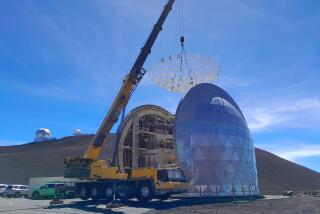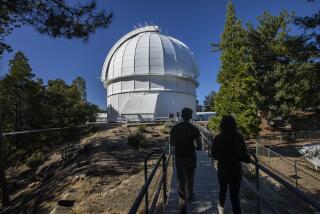If They Want to Survive, Scientists Must Learn to Share Data
- Share via
Every time astronomer William Keel makes the short trip from Tucson to the top of Kitt Peak, he goes through the same ritual.
“I say goodbye,” he says, because the next time he makes that trip, the telescopes that have helped reveal some of the secrets of the universe may be shut down.
Now his worst fears have been realized. Just a few days ago, the National Optical Astronomy Observatory in Tucson, which runs Kitt Peak, disclosed that nearly all of the telescopes on top of the Arizona mountain will be closed over the next three years.
Since the federally funded observatory at Kitt Peak provides the only access to telescopes for many astronomers, the fact that its caretakers would even consider closing them down speaks volumes about how science is changing in this country. It also shows what some scientists will have to do to survive an era whose earmarks seems to be both feast and famine.
It isn’t that the telescopes on Kitt Peak are no longer useful. The king of the mountain is a 4-meter scope that is considered one of the most productive in the world, and even it is scheduled for closure. An ongoing revolution in astronomical technology has left Kitt Peak in the dust, and with less money to go around, the observatory has elected to invest its funds in cutting-edge facilities now being built as far away as Chile.
What it means is that fewer astronomers will have access to fewer telescopes--and that bleak prospect is not unique to astronomy.
Never before have scientists had the range of sophisticated instruments that are available today. Yet never before has competition to use those instruments been as fierce.
*
We can expect stunning new developments in a wide range of scientific disciplines in the coming years, but many researchers--perhaps most in some fields--will have to change their basic approach to their work. Many will find themselves left out unless they adapt to a world in which vast storehouses of information are available but are collected by others with access to the instruments needed for the research.
When she revealed plans to close at least five of the seven telescopes on Kitt Peak, Sidney Wolff, director of the National Optical Astronomy Observatory, told me that many astronomers are going to have to change their habits.
“There will be opportunities for them to do research,” she said, but they will have to learn to use data collected by others.
The same predicament confronts several other fields, ranging from high-energy physics to some areas of medical research. And the river runs both ways. Increasingly, people with the right tools are being asked to analyze data collected by others.
The key elements that make all of this possible include personal computers and databases that are growing at explosive rates. The Hubble Space Telescope, for example, is sending back enormous amounts of data on the cosmos. Traditionally, that information would belong to the astronomer who carried out the observations. But under the rules of the game adopted for the Hubble, it belongs to the astronomical community.
So any astronomer with a powerful PC can tap into the data, although the person doing the observations gets first crack at it.
“PC architecture has reached the point where a fast, well-equipped PC can do most of the data-processing someone needs to do observational research and networks and sky surveys mean that anyone can have the ‘sky on a desk,’ ” Keel said.
Yet Keel laments the fact that many scientists--and many institutions--still regard their data as proprietary. Some scientists guard their personal archives with the zeal of a knight charged with protecting the chastity of a princess.
If many promising scientists are to survive these times, what is needed is a greater emphasis on shared data, even if that means someone else may make the most important discoveries.
That will require a fundamental change in many disciplines.
Astronomy, for example, is both burdened and blessed by the romance associated with traveling to the mountaintop to view the heavens through a powerful telescope. There is no substitute for that kind of thrill.
Several years ago, I visited the new American observatories in the Andean foothills of Chile. The telescopes, housed in traditional domes, stood out like mystical temples, surrounded by a sky so dark that the Milky Way galaxy blazed like a gossamer ribbon from horizon to horizon.
*
Astronomers walked from telescope to telescope, pointing their dim flashlights at their feet in an effort to keep light pollution at an absolute minimum.
I watched for hours one evening as one astronomer after another walked out of one of the domes, and all I could see was the dim light, pointed down. After a few steps, every astronomer stopped.
It took me a while to realize why. Although they had just been observing the sky with the most powerful tools available, every one of them paused to look up, awed by the spectacular brilliance of the night sky.
One astronomer stood alone, off to the side of one of the domes. He had brought his own small telescope to the mountain top, a compact model available in many hobby shops in Los Angeles.
Bill Keel had finished his observing time with one of the large scopes, but he couldn’t tear himself away. He wasn’t doing science with the little scope. He was just enjoying the view.
We talked for a long time that evening, and then we parted for many years. We didn’t talk again until recently, when he told me how hard it is to say goodbye to Kitt Peak.
* Lee Dye can be reached via e-mail at 72040.3515@compuserve.com
More to Read
Sign up for Essential California
The most important California stories and recommendations in your inbox every morning.
You may occasionally receive promotional content from the Los Angeles Times.













